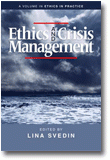
Ethics and Crisis Management
Edited by:
Lina Svedin, University of Utah
A volume in the series: Ethics in Practice. Editor(s): Robert A. Giacalone, Texas State University. Carole L. Jurkiewicz, University of Colorado, Colorado Springs.
Published 2011
The daily process of public service provision and administration is filled with value judgments and value trade-offs, and the safeguarding of just and fair processes is key to the public’s trust in governing institutions. In crises, public decision-makers face complex ethical judgments under great uncertainty, timepressure, and heightened public scrutiny. A lack of attention to the ethical dimensions of crises has lead decision-makers to long-shadow crises that never reach closure. Furthermore, crises triggered by unethical conduct by public officials steadily feed people’s cynicism about politicians and bureaucracy. The fact that decision-makers often are judged on how they dealt with ethical issues in crises further underlines the importance of this topic.
Little scholarly attention had been paid to how ethics play into and are dealt with in situations when they matters most – in crises. In order to improve government performance we need to analyze the ethical dilemmas and normative challenges that face practitioners in crises. This book meets this challenge by presenting a public policy framework for analyzing the ethical dilemmas in crises and introduces ten empirical chapters written by prominent public administration and crisis management scholars. The cases reviewed include Abu Ghraib, the 9/11 Commission, the 2008 Financial Crisis and the Memorial Hospital Tragedy during Hurricane Katrina. Building off the empirical focus on inherent ethical challenges in crises and actor ethics in evaluation and judgment, the concluding chapter outlines important lessons about criteria for crisis decision-making and strategies, the poisoned apple of bureaucratic discretion, and the nature of post-crisis evaluations.
The book is geared toward students, scholars, and practitioners concerned with public management, public sector ethics, public policy, crisis management, and the implication of these factors on business and corporate crisis management.
CONTENTS
Foreword, Mary C. Gentile. Preface. Acknowledgements. Introduction, Lina Svedin. Inherent Ethical Challenges in Bureaucratic Crisis Management: The Swedish Experience with the 2004 Tsunami Disaster, Pär Daléus and Dan Hansén. Value Conflicts in Foreign Policy Crises: How the United States and the U.K. Wrestled with the Ethical Dilemma of Going to War in Iraq, Fredrik Bynander. International Humanitarian Assistance: Legitimate Intervention or Illegitimate Interference? Lieuwe Zijlstra, Andrej Zwitter, and Liesbet Heyse. Drowning in Discretion: Crisis Management Ethics and the Problem of Aporia, Arjen Boin and Paul Nieuwenburg. The Ethical Dilemmas of Straddling the Public–Private Divide in Economic Crises, Lina Svedin. Chasing Evil, Defending Atrocities: Blame Avoidance and Prisoner Abuse During the War in Iraq, Sanneke Kuipers, Kasia Kochanska, and Annika Brändström. Communication in Crises of Public Diplomacy: The Quest for Ethical Capital, Eva-Karin Olsson. The Politics-Administration Dichotomy and the Failure of Symmetrical Responsibility Doctrines, Helena Wockelberg. The Purpose, Functions, and Ethical Dimensions of Postcrisis Investigations: The Case of the 9/11 Commission, Charles F. Parker. Uncertainty, Accountability, and the Conduct of Postcrisis Inquiries, Daniel Nohrstedt. Conclusions, Lina Svedin. About the Editor. Contributors List.
-
Paperback978-1-61735-496-0
Web price: $45.04 (Reg. 52.99)
-
Hardcover978-1-61735-497-7
Web price: $80.74 (Reg. 94.99)
- eBook9781617354984

- REF020000 - REFERENCE: Research
- BUS008000 - BUSINESS & ECONOMICS: Business Ethics
- BUS041000 - BUSINESS & ECONOMICS: Management
-
 Diversity as Strategic Opportunity
Exploring New Paths to Good Administration
Diversity as Strategic Opportunity
Exploring New Paths to Good Administration
-
 Educating in Ethics Across the Professions
A Compendium of Research, Theory, Practice, and an Agenda for the Future
Educating in Ethics Across the Professions
A Compendium of Research, Theory, Practice, and an Agenda for the Future
-
 Ethics and Risk Management
Ethics and Risk Management
-
 Ethics Training in Action
An Examination of Issues, Techniques, and Development
Ethics Training in Action
An Examination of Issues, Techniques, and Development
-
 How to Transform Workplace Bullies into Allies
How to Transform Workplace Bullies into Allies
-
 Organizational Ethics and Stakeholder Well-Being in the Business Environment
Organizational Ethics and Stakeholder Well-Being in the Business Environment
-
 Radical Thoughts on Ethical Leadership
Radical Thoughts on Ethical Leadership

